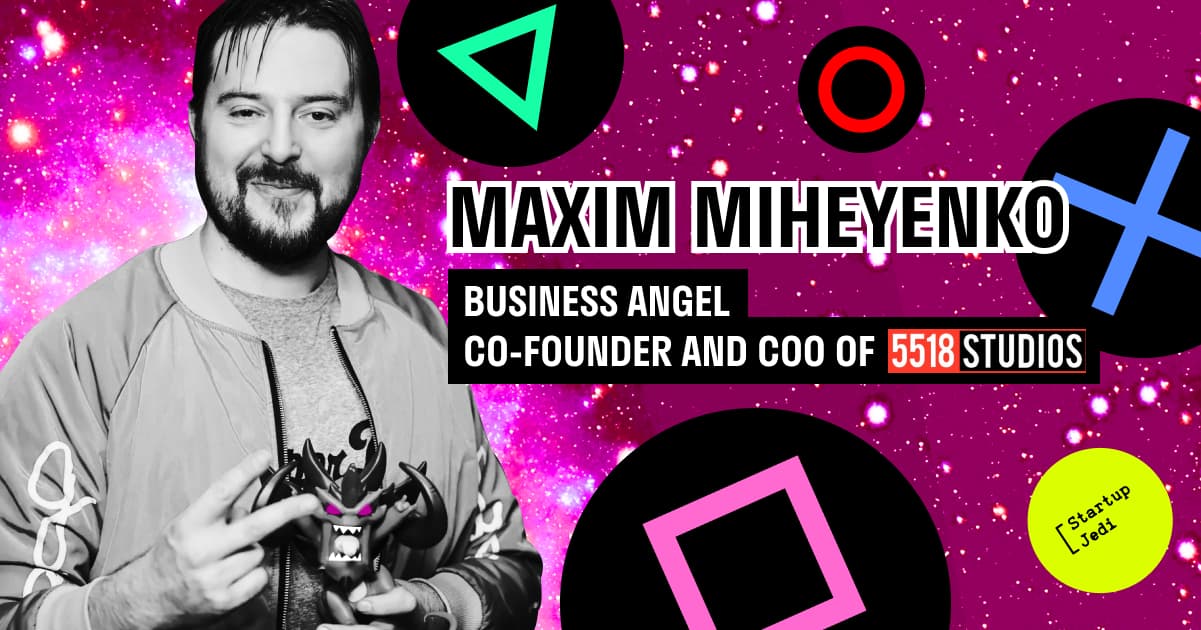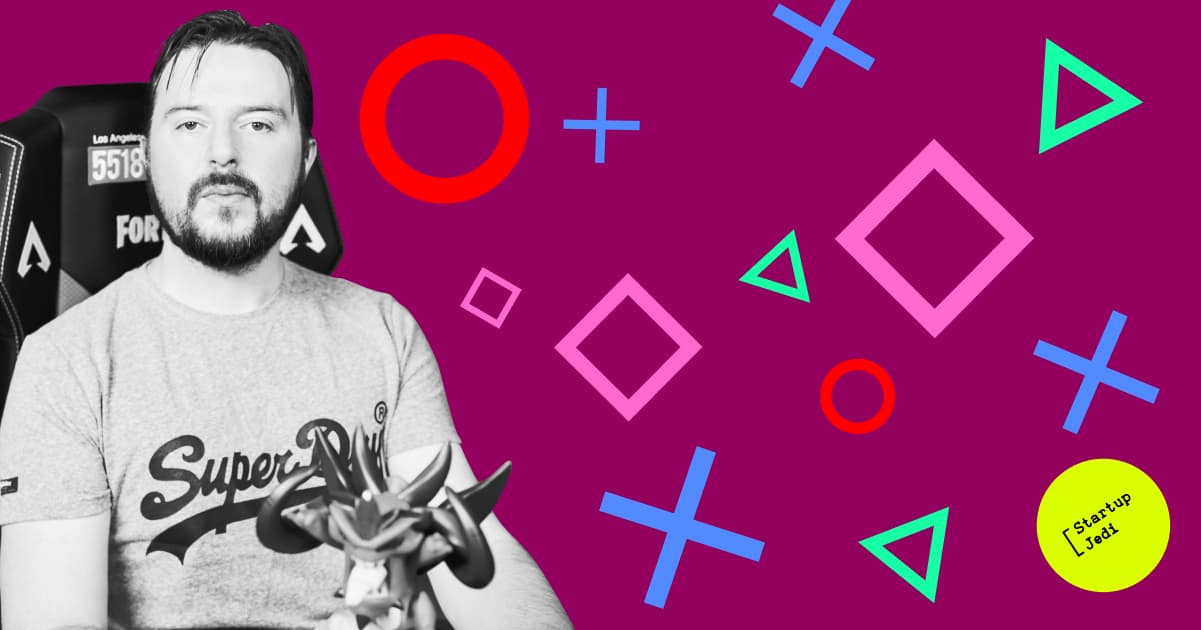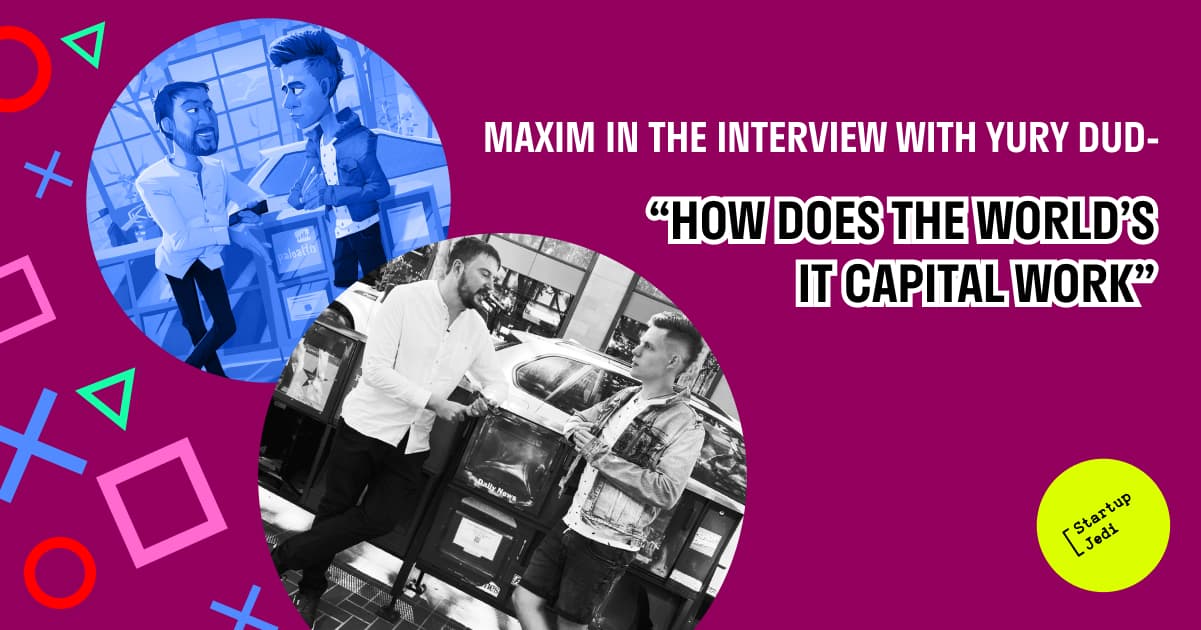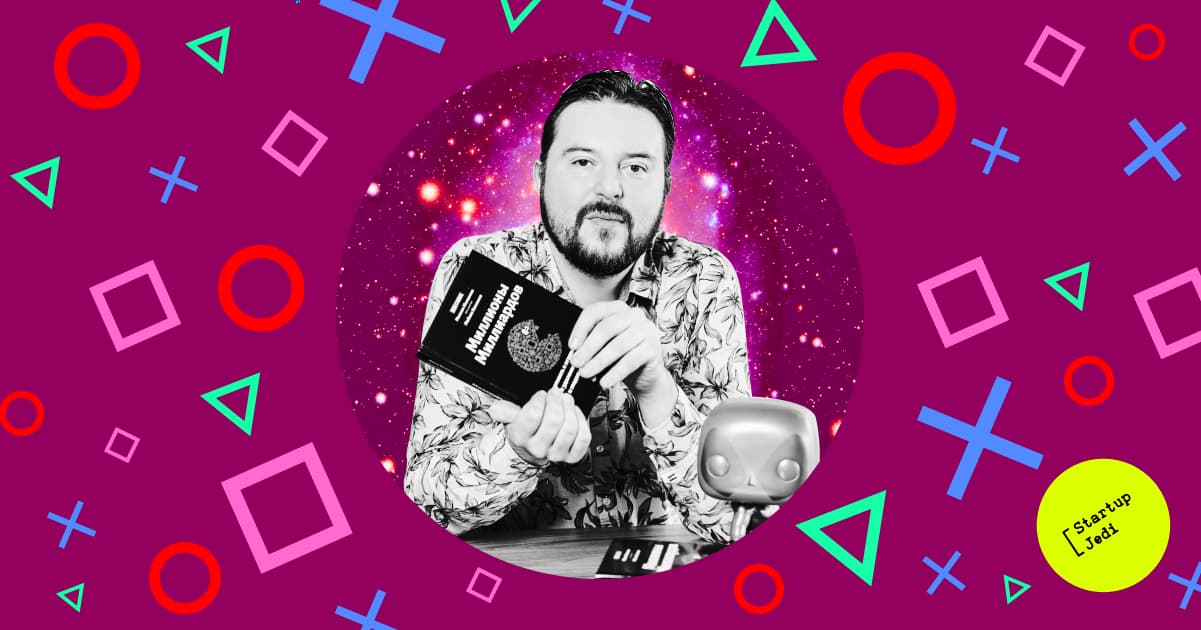
Startup Jedi
We talk to startups and investors, you get the value.
Why is venture not only and not so much about money? Who shouldn't invest in startups and why? What should a founder focus on in order to convince a serious investor to invest in a project? Maxim Miheyenko, co-founder and COO of 5518 Studios, a creator of computer graphics for game hits, including Apex Legends, Star Trek and Call of duty: Black Ops 4 (18+), knows the answers to these questions. 4 years ago Maxim first invested in a startup as an investor. He told Startup Jedi about his experience interacting with startups.

Startup Jedi
We talk to startups and investors, you get the value.
— Do I understand correctly that first of all you are a businessman, and investing is rather a hobby?
— That’s right. The main thing for me is my company. I am building a business, and investing for me goes like a thin red line throughout my life. I would even say that this is a lifestyle.
— How did you start investing? What pushed you to start?
— It all started with the fact that many of my acquaintances and friends created their own projects and asked me to consult them as a friend or mentor. I began to help, improve their projects, and saw that I was a hot ticket, that I could give a lot to people. I realized that I like this business.
From consulting friends & family, I moved on to investing in unfamiliar companies and new trends. Now my business partner Michael (Michael Casalino — a former art director of Disney) is working with American investors and funds, business angels, as well as with startups from the CIS: we bring together Eastern European projects and opportunities, smart money from the USA. We also have a team of analysts from all over the world: Canada, USA, Australia, Great Britain, Vietnam, Ukraine, Belarus and Russia. They help us audit projects from all sides (psychological check, mental interview of the whole team, financial audit, technical audit and startup super-mission).
— Are the investments related to your main business or are they absolutely independent from each other?
— We do business in games and artificial intelligence. We invest in everything related to the future. These are games, gamification, artificial intelligence, and mental health.
The niches are related, and thanks to our experience in the gaming industry, we can help startups from similar niches, take them to a new level in terms of gamification, because it is now everywhere: from educational applications for children to the new Sberbank ecosystem. Look at the great start of financial applications like Robinhood and Tinkoff Investments — they are both largely gamified.
— When and in what project did you first invest financially?
— Four years ago I invested in the House of languages that is a VR project. This is a project that I did together with my friends and where I invested my money — $ 10,000. It was for a competition from Facebook and Samsung, where we won 3rd place in the world. As a result, we got a prize of $ 15,000 and a contract from Facebook and Oculus. This was the moment I realized that such projects — small, risky, but which I do with burning enthusiasm — can be beneficial if you find your narrow niche and clearly focus on one specific thing.

...
— What do you pay attention to when communicating with founders?
—There are three fundamental things that matter the most for me.
The first is clear and sensory motivation of a person, understandable to us and suitable for potential boost. If a founder can explain his motivation in one minute to a stranger so that he is imbued with the idea — most likely, the founder himself understands what he wants, and the goal excites him! This is important. It could be, for example, motivation to be the best in what you do or motivation to make a company worth hundreds of millions of dollars as a market leader.
For example, Yuri Shlaganov from EduDo and his core team have a very clear, understandable motivation. It is workable, clear and predictable. Therefore, we have invested in this project.
Motivation like “I have a lot to do, but I decided to do this, I can’t really say why” is a very bad motivation. Unfortunately, some startups still have it. The team of House of languages VR, which I mentioned above, had a common desire to rock in the VR learning niche, win first place in the competition and get the attention of the jury from Facebook Oculus, which was judged by John Carmack himself (one of the authors of Quake and Doom, I’m a fan). We had an overarching goal, we ended up taking third place, although hundreds of projects from all over the world took part. But if we didn’t have a goal to take all the stars, if we just wanted to participate in a get-together, we most likely would not have shown such a result. We need to aim as high as possible and give our best.
The second thing I always pay attention to is focusing on one goal. It should be clear to me that a person is engaged in a project for at least 6–8 hours a day, that he is really into it. If a founder works in a large corporation, doing a startup in the evenings this is a very risky story, because his focus is not entirely and not always on his project.
The third thing is the high level of competence of founders in the field where the project is developing. After Dud’s interview, businessmen from other spheres started contacting me asking for help in developing gaming industry projects. But if a person is not a professional in the gaming industry, it is difficult for him to come up with something truly unique. You need to understand the market, immerse yourself in competencies, play all the modern games and understand the trends. That is, to be a real expert, a professional in his field with at least 3–5 years of work experience in the industry on top projects or positions.

...
— How much do you usually invest in startups and how many deals do you make a year?
— Honestly, we do not have a mandatory financing strategy like “investing this much per year”. We consider the situation. On average, we get 3–4 deals per year, but those we believe in and are comfortable working with together.
Studying the experience of colleagues in Silicon Valley: the Lieberman brothers, Andrey Doronichev from Google, Dmitry Dumik — I clearly see that there should be a team of founders that I want to work together with for a LONG time. If we do not feel synergy with the team, we are not very comfortable communicating, people are prioritizing their own interests, the founders quarrel with each other — we will rather say no, because, in our opinion, it is from synergy and general support that successful projects are born. It is important for me to understand that we reinforce each other. If we see that we will not reinforce the team, then we simply back off. I believe in the karmic concept of giving: if I cannot give anything here, then I will give the opportunity to other investors and angels to help.
Venture is a risk you can never predict. We get a bang out of the process and the startup mission, if this is not the case, we most likely will not achieve the desired result.
— You have been investing for 4 years. Perhaps there is already a certain conversion in terms of the number of successful deals?
— For a number of reasons (we all honor the strict NDA) I cannot disclose financial aspects. I can say that in my vision, the main thing is not only the conversion itself, but the general flow and smart money that are very important. Some projects did not bring us any obvious money, but they introduced me to the right people who opened important doors. How can this contribution be assessed?
Thus, I got to know Shauna Heller (Head of Product Success, McD TechLabs, — Startup Jedi) thanks to the House of Languages VR project, and she is now one of the main people in the innovative team of the new McDonald’s. We became good partners with her, she brought us several projects. It was then that she was among the judges of the competition from Samsung and Facebook Oculus, that we took part in. This is a somewhat passive yet important success because the network really matters.
In addition to financial indicators, energy is very important. Interacting with people like Shauna, Michael, Yuri, I get inspired everyday. I understand why I work, why I live. Synergy to create the future together is just as important as money. When you don’t worry about money anymore, you start thinking about something else: what will we leave behind? The point is that this is not just naked capitalism, it is much more: real help to people and support for projects that the world needs.
If you work with people who you always have something to learn from, you just bliss out with them every day, then there will always be results, even if the project is not the best in terms of finances, it will give a lot in a different way. Today we interact with all the people who we started doing projects with at the investment stage, business angels. They offer something, I invite them somewhere. It’s a synergy of family & friends.
— How has the venture industry changed during your work in it?
— Thanks to the projects of Robin Hood Ventures, Tinkoff Investments, the venture capital market has changed dramatically both in the world and in the CIS. There used to be many requests from people from the United States who have, say, a million dollars, which they are ready to invest in experimenting with startups. Now they can invest this money in stocks of Apple, Amazon, Starbucks, Tesla. Thanks to the Tinkoff Investments, Sberbank Investments or Robin Hood projects, this can be easily done in 5 minutes.
We recommend that people, if they are not sure whether it is worth investing in startups, if they have not smart money, but just money, — to invest in large proven corporations of the future. The chance that these companies will be unprofitable tomorrow is much less than the chance that a mini-startup from Kazan or Gomel will succeed.
Now venture funds are becoming more and more highly specialized. The market is consolidating: if you can offer something on the market, it’s superb, but if you just have money, now this is no longer enough. Money itself has not been a guarantee of success for a long time already. Financial flows, unfortunately, do not help, and in such cases it is better to invest in large corporations if you have money and want to increase funds. In real, true venture, there are people who are ready to bring smart money and their expertise and are passionate about this business. In this case, it is a venture story and a startup story.
Large corporations didn’t use to compete on the same field with small startups for the money of small investors and business angels from all over the world. And now many startups in the CIS are fighting for attention not only with each other, but also with large corporations such as Apple, Tesla, Amazon, or Activision Blizzard. It used to be difficult, now it’s a matter of three minutes.
...
— What projects do you remember working with and why?
— I like the guys from MyBuddy.AI. This is a language teaching app for kids. Their example showed how you can successfully raise investments in the children’s niche from Russia and the USA, working for the whole world with a team of several people who are passionate about their work. They have large production that is basically done by 2 people: one in Silicon Valley, the other in Moscow. They also have a great desire to change the education market for children, and they are changing it right now. This is an example that the number of members in a team can be small, it is important to discover and solve real pain.
I also admire the Spatial.io project team from New York and the guys from prometheanai.com from Los Angeles. These are projects that I absolutely believe in and that set a new standard for quality in their fields. The founders of these projects have been burning with their work for more than one year, each has incredible competencies in their field. For example, in the promethenai.com project, Andrey Maksimov (CEO) has been working in computer graphics for over 12 years, and worked as the technical art director of Naughty Dog. And his new brainchild is Promethean AI, a project that will possibly revolutionize computer graphics. It is on such projects that the belief in venture history is based.
...
— As far as I know, you come from Russia, but you work in the United States: what are the trends in the field of venture and startups in the United States now? Which of them have already reached the post-Soviet countries?
— It is mental health, gamification in all areas, the theme of the gaming industry in terms of AR, VR, next-generation consoles. We work with the whole world, and these trends are relevant everywhere. We do not look at projects on the local market, we pay 100% attention only to global world trends.
— You wrote the book called Millions of Billions. How to get started in the gaming industry, working remotely, make money and create the game of your dreams ”(Peter Publishing, 2020). Can you advise gaming startups what mistakes are important not to make and what to place the stake on?
— The book is more about our work in the gaming industry, about our mentality. We wrote this book with my co-founder Michael. It was he who in many ways suggested to me how to find a common language with the Americans. In our book, we tell you why you need to go into the gaming industry and why you shouldn’t go there. This is a kind of tutorial on how to take the first steps in the industry. It can also be useful for those who are ignorant of the gaming industry, but want to work in the IT field, and engage in architectural design. There are many secrets inside about how to work with foreigners, about positive thinking, about the fact that it is important to always think well of the client, it is important to be proactive. This is what will help you stand out from the rest of the professionals in your field. There are more and more specialists, but there are still very few people who can build emotional intelligence.

...
— How does the COVID-19 pandemic and its consequences affect startups?
— Our team is distributed all over the world and we did not feel strong losses from the pandemic. In our company, we had been practicing telecommuting for a long time, so we did not notice a big difference. True, there is more work, because we were able to adapt to the pandemic from the very beginning. What is clearly visible is that the competition in the world has intensified even more. More and more participants come to the gaming industry. Previously, it was an elite art, now it is becoming a business, and many people come here not because they like it, but because they do not have a job and they need to survive, find new paid work. The gaming industry is becoming the same as the rest, where you can just make money. More and more such people will come to our small industry in the next 5–10 years.
A recent global case study is that Microsoft bought PC game maker Bethesda for $ 7.5 billion. This is the largest purchase receipt for gaming companies right now, and for many financial analysts it is an indicator that the gaming industry will soon become a very hot place with a huge number of acquisitions. The industry is becoming real, “adult”.
...
— What is your advice to startups: when to look for an investor and how to communicate with him? A startup can be awesome, but sometimes people fail to present themselves.
— Unfortunately, in the post-Soviet countries, we were not taught to sell ourselves correctly and quickly, so to speak, to pitch. In the United States, from childhood, they are taught to present themselves promptly, clearly and up a storm.Unfortunately, very few people have succeeded so far to speak with an investor from Palo Alto, Zurich or Monaco in his language, to really hear him. We notice that when you meet new start-ups in the CIS, people fanatically talk only about their project and forget that the investor is also a person and he has his own needs.. Therefore, the first advice is that it is necessary to clearly propose what exactly the potential investor will receive from participation in the project, the founders should have a win-win solution. You need to not only take, but also give, and do it right away, because the first minutes are decisive. In Silicon Valley, successful startups often base their approach on why a particular investor needs this project. They proceed from what an investor — a business angel or a fund — will receive from joining their project. They come from the interest of each investor and build an individual approach. Venture story is a story about people, about the feeling of being needed, about the exchange of energy, knowledge, and experience.
The second advice is that there should be a clear focus on your goals, a clear understanding of them. We noticed that when you ask a question to the founder: “Are you ready to give up everything unnecessary, even if there is no funding, and continue this project?” — and the founder doubts, this is already evidence that the person may not be ready for 100% commitment to the project. A startup is a long journey, no one says that tomorrow the project will definitely succeed — rather, it is a long series of growth and decline. But if you are confident in yourself and in your project — with funding, without funding — then you will achieve your goal. Now we must understand that a successful startup business is at least a five-year story that will constantly change. There will be money or not but this is not primary. The main thing is that the founders have energy, the fuse for many years to do what you love and what you believe in. After these insights, many drop out, because there are only a few projects that were really born with love, on which the founders plan to work for a long time, and many investors are looking for them.
Facebook: facebook.com/StartupJedi/
Telegram: t.me/Startup_Jedi
Twitter: twitter.com/startup_jedi
Comments